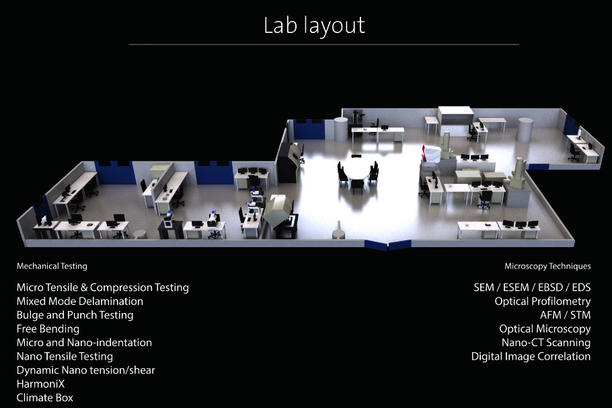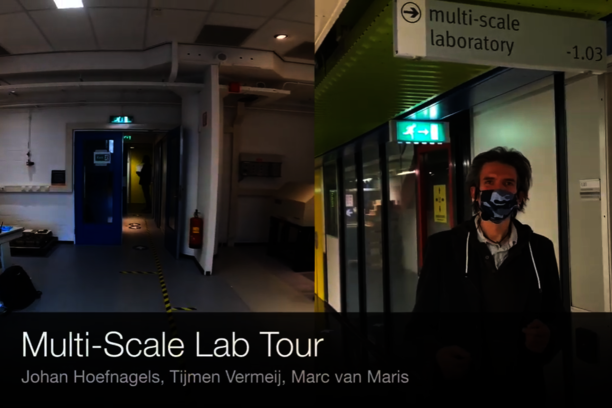Multiscale Lab
The Multiscale Lab facilitates research on the micro-mechanical deformation and failure behavior of a broad class of (innovative) materials and material systems.
Revealing deformation and failure
A computer chip that delaminates at high temperatures, paper that warps during printing, or a cast iron engine that fractures when operated at high power: all these problems originate from properties of the materials involved. It is often not obvious when and why materials deform or fail, especially where new composite materials are concerned. The Multiscale Lab contains a range of advanced facilities to investigate such failures at the core, i.e. at the level of the material’s microstructure.
From industry to innovation
The Multiscale Lab facilitates research on the microstructures that underpin the failure behavior and deformation of materials. This research is often prompted by practical questions posed by industry, ranging from the failure behavior of innovative, flexible materials for solar cells to the robustness of lighter types of steel for the automotive industry. The fundamental understanding gained in studies like these is applied in the development of innovative materials that in turn find their way back into industry.
Unique equipment
The Multi-Scale Laboratory of the Mechanics of Materials group of Prof. Marc Geers takes a rather unique position as it bridges the gap between traditional materials science and mechanical characterization labs, by integrating (micro-)mechanical testing with (real-time and in-situ) microscopic observation. With a focus on developing novel (miniature) testing devices and strategies, the lab allows for quantitative in-situ microscopic measurements during deformation and mechanical characterization of a broad class of materials, structures, MEMS (Micro-Electromechanical Systems), etc., on a wide range of length scales from nanometers to centimeters.
Mechanical testing in an electron microscope
Working in this way, the lab's experts developed an instrument to bend flexible electronics, such as solar cells, while simultaneously imaging the deformation and failure behavior using an electron microscope. To test and simultaneously study the failure behavior of sheet steel at the level of microstructural deformation mechanisms they also developed an in-situ SEM testing device. Both instruments resulted in journal publications.
Cooperation
The Multiscale Lab collaborates with numerous partners in high-tech systems, the automotive industry, the aerospace industry, energy and manufacturing & printing. They include ASML, DAF, DIFFER, DSM, Fokker, Océ, Philips, NRG, NXP, Tata and TNO. The laboratory is open to address problems of external parties, provided that the research triggers scientific interest. For more information, those interested should contact Johan Hoefnagels.
More information about our unique equipment
Visit our other state-of-the-art labs and facilities
Contact us
-
Lab supervisor
Faas Husseining. Marijn Weylant BGrinwis Plaat Stuitjesboulevard2516XJ Delft -
Lab manager
Jayson TimmermansEcrin van der Bergvan der Wallaan3411AK Volendam -
Lab technicus
mr. Vigo Sambo MAVince MolenaarEelmanstraat7361TD Enspijk

